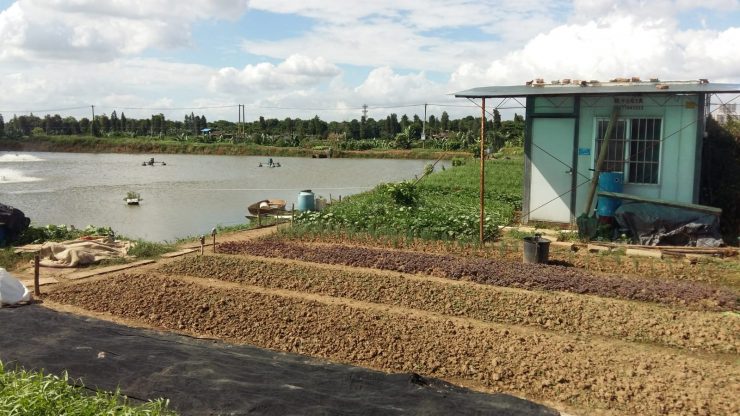Guest editors: Karita Kan and René Trappel
The globalization of agricultural production and food systems has brought fundamental changes to agrarian economies around the world. While connecting rural communities to global circuits of production and distribution, the rise of corporate capital in agri-food production has increasingly come under challenge for subsuming local development needs and environmental sustainability to market-oriented agendas (Borras 2010; Burnett and Murphy 2014; McMichael 2014). In particular, the advent of industrialized farming has been criticized for advancing capital at the expense of smallholders, from the exploitation of farm labor to the displacement of rural communities and erosion of grassroots land control (Moyo and Yeros 2005; McMichael 2007). These problematic aspects have triggered a search, similarly global in nature, by scholars, policymakers and producers to identify and promote alternative, sustainable, and less socially-destructive forms of agricultural production.
As a globalizing economy undergoing market-led rural reform, with decades of preceding experience in agricultural collectivization under state socialism, China presents a unique and significant case for comparative research into pathways of agrarian transition (Bernstein 2013; Byres 1996). The country seems to be host to both sides of the new globalized agrarian production. On the one hand, the Chinese government’s unambiguous promotion of agricultural modernization has contributed to the scaling up of agriculture and the increased takeover of production activities by organized capital in the form of “dragonhead enterprises”, domestic agribusiness firms supported by the Chinese state to spearhead the country’s engagement with global export markets (Schneider 2016). The entry of capital into the countryside has been described as the rise of “agrarian capitalism”, where the means of production increasingly fall under corporate control and once independent producers start to sell their labor for subsistence or leave agriculture altogether (Zhang and Donaldson 2008; Yan and Chen 2015). These changes have taken place despite the continued existence of collective property institutions, an institutional framework that is seen to offer protection to the rights and interests of smallholders (Trappel 2016).
On the other hand, the Chinese countryside has also been the site of experimentation in alternative models of economic organization that go beyond corporate agriculture. Officially, Beijing seems to be endorsing cooperatives as an alternative but similarly viable path towards modern agricultural production (Huang 2011). Rural cooperatives saw a marked proliferation in the 2000s, especially following the introduction of the 2007 Law on Farmers’ Specialized Cooperatives (Deng et al. 2010; Song et al. 2014). As of 2016, there were 1.67 million cooperatives nationwide (China Daily 2017), although there are valid reservations about the nature and effects of the cooperative movement (Hu et al. 2017). Local initiatives in community-based economic practices have also invigorated discourses and movements in food sovereignty, as evidenced in the establishment of the People’s Food Sovereignty Network in 2013 by researchers, students and civil activists based in mainland China, Hong Kong and Taiwan.
This special issue seeks contributions on the topic of agrarian futures in China at the crossroads of collectivist legacies and global capitalism. We are interested in papers that explore the role of and interaction between capital, collectives and communities in the context of agrarian change in China. Please send abstracts of 200-300 words by February 29, 2020 to the guest editors at karita.kan@polyu.edu.hkand rene.trappel@sinologie.uni-freiburg.de.Authors of selected abstracts would be invited to submit a full paper by July 31, 2020 and attend a paper workshop to be held at Hong Kong Polytechnic University in the week of August 24, 2020. Limited funding can be made available to participants who require support for travel and accommodation.
The special issue is scheduled to be published in a 2021 issue of China Perspectives.
References
BERNSTEIN, Henry. 2015. “Some reflections on agrarian change in China.” Journal of Agrarian Change 15(3): 454-77.
BORRAS, Saturnino M. 2010. “The politics of transnational agrarian movements.” Development and Change 41(5): 771-803.
BRANDT, Loren, et al.2002. “Land rights in rural China: Facts, fictions and issues.” The China Journal 47: 67-97.
BURNETT, Kim, and Sophia MURPHY. 2014. “What place for international trade in food sovereignty?” Journal of Peasant Studies 41(6): 1065-84.
BYRES, Terence J. 1996. Capitalism From Above and Capitalism From Below. New York: Palgrave Macmillan.
CHINA DAILY. 2017, April 10. Farmer co-ops reap rewards. Retrieved from http://epaper.chinadailyasia.com/asia-weekly/article-11842.html(accessed on October 31, 2017).
DENG, Hengshan, et al. 2010. “Policy support and emerging farmer professional cooperatives in rural China.” China Economic Review 21(4): 495-507.
HU, Zhanping, Qian Forrest ZHANG, and John A. Donaldson. 2017. “Farmers’ cooperatives in China: A typology of fraud and failure.” The China Journal 78(1): 1-24.
HUANG, Philip. 2011. “New-age small farms and their vertical integration: Agribusiness or co-ops?” Modern China 37(2): 107-34.
MCMICHAEL, Philip. 2007. “Feeding the world: Agriculture, development and ecology.” Socialist Register 43: 170-94.
MCMICHAEL, Philip. 2014. “Historicizing food sovereignty.” Journal of Peasant Studies 41(6): 933-57.
MOYO, Sam, and Paris YEROS (eds.). 2005. Reclaiming the Land: The Resurgence of Rural Movements in Africa, Asia and Latin America. London and New York: Zed Books.
SCHNEIDER, Mindi. 2016. “Dragon head enterprises and the state of agribusiness in China.” Journal of Agrarian Change 17(1): 3-21.
SONG, Yiching, et al. 2014. “Farmer cooperatives in China: Diverse pathways to sustainable rural development.” International Journal of Agricultural Sustainability 12(2): 95-108.
TRAPPEL, René. 2016. China’s Agrarian Transition: Peasants, Property, and Politics. Lanham: Lexington Books.
YAN, Hairong, and Yiyuan CHEN. 2015. “Agrarian capitalization without capitalism? Capitalist dynamics from above and below in China.” Journal of Agrarian Change 15(3): 366-91.
ZHANG, Qian Forrest, and John A. Donaldson. 2008. “The rise of agrarian capitalism with Chinese characteristics: Agricultural modernization, agribusiness and collective land rights.” The China Journal 60: 25-47.



